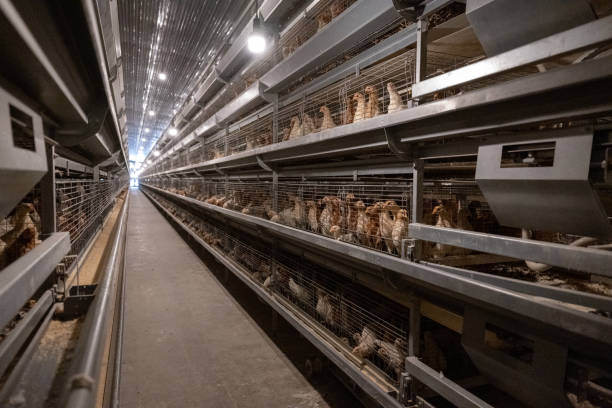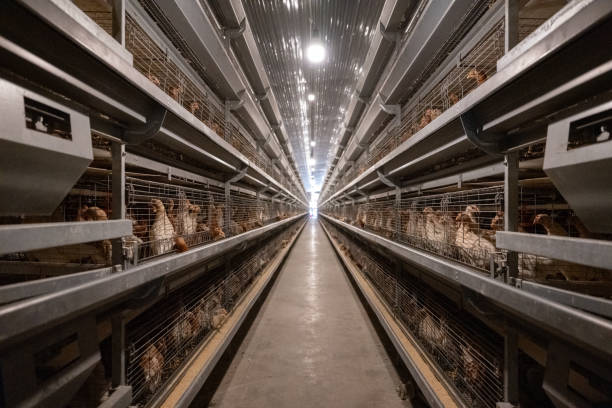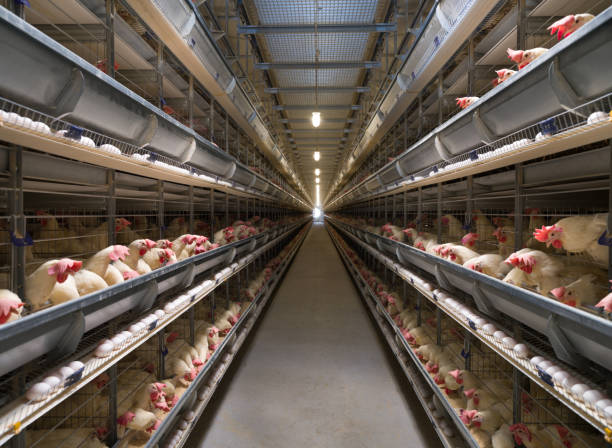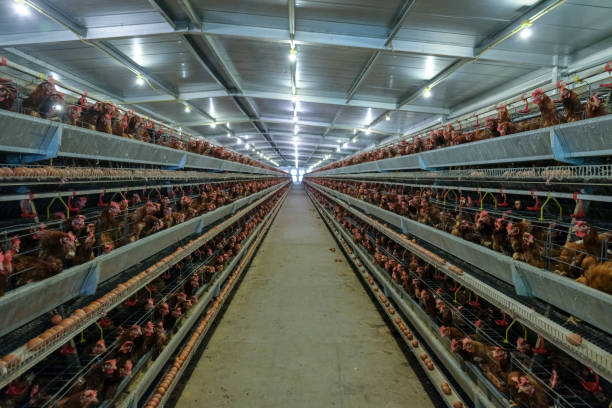
Battery Cage Systems for Profitable Large-Scale Poultry Farming in Tanzania
Battery Cage Systems for Profitable Large-Scale Poultry Farming in Tanzania
For ambitious poultry farmers in Tanzania looking to scale up their operations and maximize profits, battery cage systems offer a compelling solution. These systems, while sometimes controversial, provide a highly efficient and controlled environment for egg production and broiler rearing. Understanding the nuances of battery cage systems, their benefits, challenges, and best practices is crucial for making informed decisions and establishing a profitable poultry business.
What are Battery Cage Systems?
Battery cage systems are a method of housing poultry, primarily laying hens and broilers, in rows of identical cages connected together. Typically, these cages are constructed of metal or wire mesh and are designed to house multiple birds in a relatively small space. The cages are arranged in tiers, maximizing the use of vertical space in a poultry house.
The Evolution and Purpose of Battery Cage Systems
Battery cage systems emerged as a response to the growing demand for affordable poultry products. The intensification of poultry farming necessitated more efficient methods of housing and managing large flocks. The purpose of battery cage systems is to:
Increase Productivity: By concentrating birds in a controlled environment, farmers can optimize feeding, watering, and lighting, leading to higher egg production or faster growth rates for broilers.
Improve Hygiene: Elevated cages with sloped floors facilitate the removal of waste, reducing the risk of disease and improving overall hygiene.
Reduce Labor Costs: Automated feeding, watering, and egg collection systems minimize the need for manual labor.
Maximize Space Utilization: Tiered cages allow for a higher stocking density, maximizing the number of birds that can be housed in a given area.
Benefits of Battery Cage Systems in Tanzania
Tanzanian poultry farmers can reap several benefits by adopting battery cage systems, particularly for large-scale operations.
Increased Egg Production: Battery cages provide a controlled environment that optimizes egg production. Hens are protected from predators, extreme weather conditions, and social stress, resulting in consistently higher egg yields. The birds have constant access to food and water, and the structured environment reduces competition for resources.
Improved Feed Conversion Ratio: Battery cages enable farmers to closely monitor and control feed consumption. This precision feeding, coupled with reduced activity levels, leads to a better feed conversion ratio. This means that the birds require less feed to produce each egg or gain each kilogram of weight, directly impacting profitability.
Reduced Disease Outbreaks: The separation of birds in individual cages or small groups minimizes the spread of diseases. The elevated cages prevent contact with floor litter, reducing the risk of parasitic infections. Regular cleaning and disinfection of cages are easier to implement, further enhancing biosecurity.
Labor Efficiency: Automated feeding, watering, and egg collection systems dramatically reduce labor requirements. This is particularly beneficial for large-scale farms where manual tasks can be time-consuming and expensive. The reduced labor costs contribute to the overall profitability of the operation.

Better Egg Quality: Eggs collected from battery cage systems are typically cleaner and less prone to contamination. The sloped floors of the cages allow eggs to roll away from the hens, preventing them from being soiled by feces. This results in higher egg quality and reduces the need for extensive cleaning.
Predator Protection: Battery cage systems provide excellent protection against predators such as rodents, snakes, and wild birds. This is especially important in rural areas of Tanzania where poultry farms are often vulnerable to predator attacks.
Precise Environmental Control: Modern battery cage systems can be integrated with climate control systems that regulate temperature, humidity, and ventilation. This allows farmers to create an optimal environment for their birds, regardless of external weather conditions.
Challenges of Battery Cage Systems
While battery cage systems offer numerous advantages, it’s essential to acknowledge the potential challenges:
Animal Welfare Concerns: This is probably the biggest sticking point. Battery cages have been criticized for restricting the natural behaviors of chickens, such as nesting, perching, and dust bathing. Animal welfare activists argue that the confinement of birds in small cages can lead to stress, frustration, and behavioral problems.
Initial Investment Costs: Setting up a battery cage system requires a significant initial investment. The cost of cages, automated equipment, and climate control systems can be substantial. Farmers need to carefully evaluate the financial implications and ensure that they have access to sufficient capital.
Maintenance and Repairs: Battery cage systems require regular maintenance and repairs to ensure their proper functioning. Automated equipment can break down, and cages may need to be replaced over time. Farmers need to budget for these expenses and have access to skilled technicians.
Electricity Dependence: Automated systems rely heavily on electricity. Power outages can disrupt feeding, watering, and ventilation, potentially leading to stress or even mortality. Farmers should consider investing in backup generators to mitigate this risk.
Waste Management: Battery cage systems generate large quantities of manure, which needs to be properly managed to prevent environmental pollution. Farmers need to have a plan for manure collection, storage, and disposal or utilization.
Public Perception: The public perception of battery cage systems is often negative due to animal welfare concerns. Farmers need to be aware of these concerns and be prepared to address them. Transparency and responsible animal husbandry practices can help to build trust with consumers.
Best Practices for Profitable Battery Cage Farming in Tanzania
To maximize profitability and address the challenges associated with battery cage systems, Tanzanian poultry farmers should adhere to the following best practices:
Choose High-Quality Equipment: Invest in durable, well-designed battery cages from reputable suppliers like Livi Machinery. Opt for cages made from corrosion-resistant materials that are easy to clean and maintain.
Maintain Optimal Stocking Density: Follow recommended stocking densities to avoid overcrowding and ensure the well-being of the birds. Overcrowding can lead to increased stress, disease outbreaks, and reduced egg production.
Provide a Balanced Diet: Formulate a nutritionally balanced diet that meets the specific needs of the birds. Consult with a poultry nutritionist to develop a feeding program that optimizes egg production or growth rates. Ensure constant access to clean, fresh water.
Implement a Strict Biosecurity Program: Implement a comprehensive biosecurity program to prevent the introduction and spread of diseases. This should include measures such as controlled access to the farm, regular disinfection of facilities, and vaccination of birds.
Maintain a Clean and Hygienic Environment: Regularly clean and disinfect the cages and surrounding areas. Remove manure promptly to prevent the build-up of ammonia and other harmful gases. Proper ventilation is essential to maintain air quality.
Monitor Bird Health and Welfare: Regularly monitor the birds for signs of illness or distress. Provide prompt veterinary care when needed. Train staff to recognize and address potential welfare issues.
Invest in Climate Control: Install climate control systems to regulate temperature and humidity. This is especially important in regions with extreme weather conditions. Proper ventilation is essential to remove excess heat, moisture, and ammonia.
Manage Manure Effectively: Develop a plan for manure collection, storage, and disposal or utilization. Composting, biogas production, or use as fertilizer are sustainable options. Ensure that manure is stored and handled in a manner that minimizes environmental pollution.
Train and Supervise Staff: Provide adequate training to staff on all aspects of battery cage farming, including animal husbandry, biosecurity, and equipment maintenance. Supervise staff closely to ensure that they are following best practices.
Keep Accurate Records: Maintain accurate records of egg production, feed consumption, mortality, and other key performance indicators. This will help to identify areas for improvement and track the profitability of the operation.
Embrace Technology: Explore opportunities to incorporate technology into the farming operation. Automated systems, sensors, and data analytics can help to improve efficiency, reduce costs, and enhance decision-making.
Consider Alternative Cage Systems: While traditional battery cages are the most common type, enriched cage systems are also available. These systems provide hens with more space and amenities such as perches, nesting boxes, and scratching areas. While they may be more expensive, enriched cage systems can address some of the animal welfare concerns associated with battery cages.
Livi Machinery: Your Partner in Profitable Poultry Farming
Livi Machinery is a leading supplier of high-quality poultry equipment, including battery cage systems, to farmers in Tanzania and worldwide. We offer a comprehensive range of solutions to meet the diverse needs of poultry farmers, from small-scale operations to large-scale commercial farms.
High-Quality Cages: Our battery cages are made from durable, corrosion-resistant materials and are designed for optimal ventilation, hygiene, and bird welfare.
Automated Equipment: We provide a complete range of automated equipment, including feeding systems, watering systems, egg collection systems, and manure removal systems.

Climate Control Systems: Our climate control systems can help you regulate temperature, humidity, and ventilation to create an optimal environment for your birds.
Expert Support: Our team of experienced poultry specialists can provide you with expert advice and support on all aspects of battery cage farming.
Customized Solutions: We can customize our solutions to meet your specific needs and budget.

Conclusion
Battery cage systems can be a profitable solution for large-scale poultry farming in Tanzania when implemented correctly. By understanding the benefits, challenges, and best practices, Tanzanian poultry farmers can maximize their returns while ensuring the well-being of their birds. Partnering with a reputable equipment supplier like Livi Machinery can provide access to high-quality equipment and expert support, enabling farmers to establish and maintain a thriving poultry business. Balancing the need for efficient production with ethical considerations and continuous improvement will be paramount for the long-term sustainability of the poultry industry in Tanzania. While embracing modern technologies and farming practices, it is crucial to remain sensitive to animal welfare and the evolving consumer preferences within the Tanzanian market.
